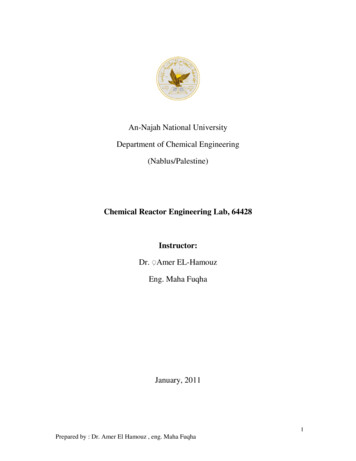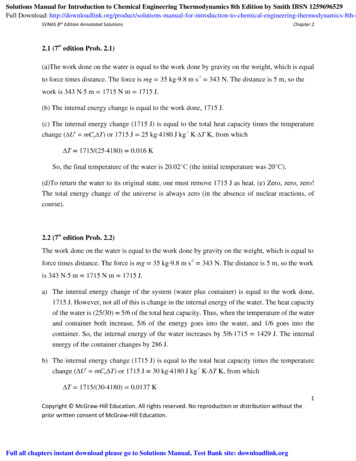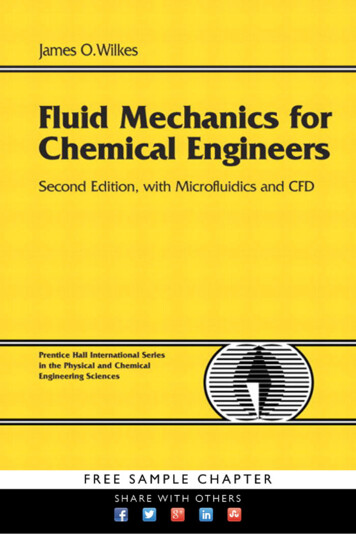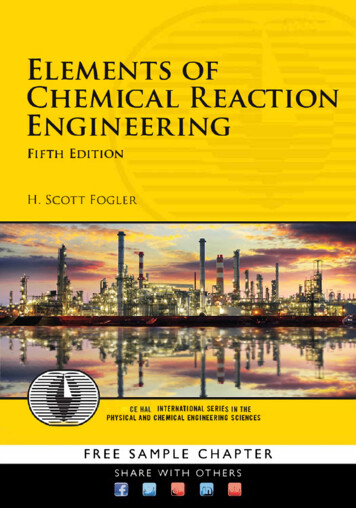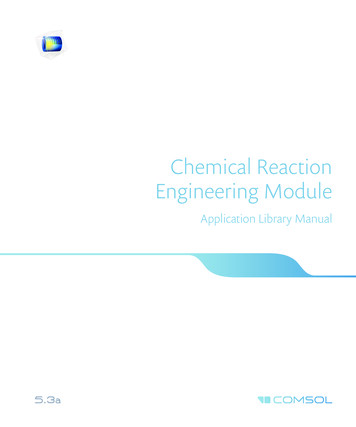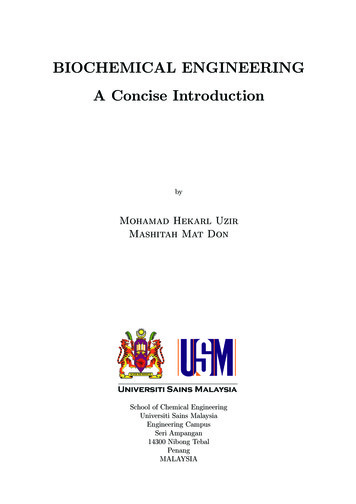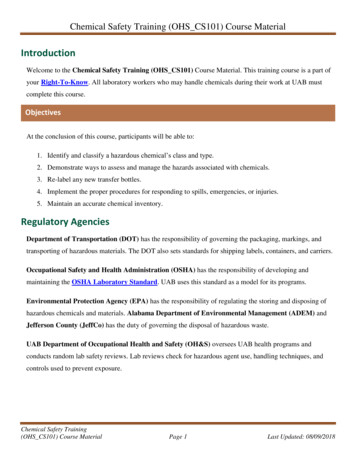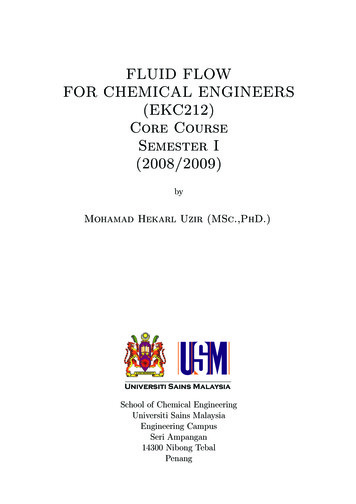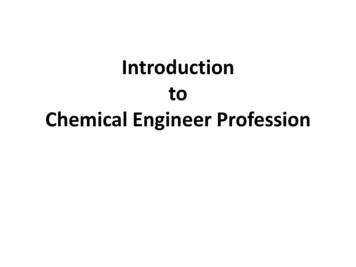
Transcription
IntroductiontoChemical Engineer Profession
What are Chemical Engineers?“Chemical engineers” use math, physical sciences(physics, chemistry), life sciences (biology,microbiology and biochemistry), and economics tosolve practical problems. The difference betweenchemical engineers and other types of engineers isthat they apply a knowledge of chemistry in additionto other engineering disciplines. Chemical engineersmay be called “universal engineers” because theirscientific and technical mastery is so extensive.
History of Chemical EngineeringBefore 18th Century:Industrial chemicals were mainly produced throughbatch processing.Industrial Revolution (1700-1800):Industrial production shifted from batch tocontinuous processing.
History of Chemical EngineeringChE Principles:1805 - John Dalton published Atomic Weights, allowingchemical equations to be balanced and the basis forchemical engineering mass balances.1824 - Sadi Carnot was the first to study thethermodynamics of combustion reactions.1850 - Rudolf Clausius applied the principles developedby Carnot to chemical systems at the atomic tomolecular scale.
History of Chemical EngineeringChE Principles:1873 to 1876 - Josiah Willard Gibbs developed amathematical-based, graphical methodology, for thestudy of chemical systems using the thermodynamicsof Clausius.1882 - Hermann von Helmholtz showed that measureof chemical affinity is determined by the measure ofthe free energy of the reaction process.1883 - Osborne Reynolds defines the dimensionlessgroup for fluid flow, leading to practical scale-up andunderstanding of flow, heat and mass transfer
History of Chemical EngineeringChE Education:1882 – a course in "Chemical Technology" is offered atUniversity College London.1885 –a course in "chemical engineering" is offered atCentral College (later Imperial College), London.1888 –a new curriculum at Massachusetts Institute ofTechnology (MIT) started: Course X, ChemicalEngineering.
Course X at MIT: "to meet the needs of students who desire a general training inmechanical engineering, and at the same time to devote a portion of their time to thestudy of the applications of chemistry to the arts, especially to those engineeringproblems which relate to the use and manufacture of chemical products."
History of Chemical EngineeringChE Institutes:1908 – the American Institute of Chemical Engineers(AIChE) is founded.1922 – the UK Institution of Chemical Engineers(IChemE) is founded.1996 – the Thailand Institute of Chemical Engineeringand Applied Chemistry (TiChE) is founded.
A Century of ChE ProfessionWhat are the great accomplishmentsdo we come up with?
TOP 10 Chemical EngineeringContribution to SocietyAMERICAN INSTITUTE OF CHEMICAL ENGINEERS, 2010
TOP 10 Chemical EngineeringContribution to Society1. FUELING THE WORLD’S ECONOMIES The world's economy needs energy to keep itmoving. Chemical engineers stretch fossil fuels into variousenergy supplies, e.g. gasoline, diesel, jet oil, etc.AMERICAN INSTITUTE OF CHEMICAL ENGINEERS, 2010
TOP 10 Chemical EngineeringContribution to Society2. CREATING CLEANER ENERGYChemical engineers are creating a new generation ofclean energy technologies.- Nuclear power plant- NiMH battery- Alternative energies such as Air , Wind, Water,Solar, etc.AMERICAN INSTITUTE OF CHEMICAL ENGINEERS, 2010
NiMH battery for vehicles
Air for vehicles
TOP 10 Chemical EngineeringContribution to Society3. PRODUCTS FOR GROWING POPULATIONS- Water purification- Water desalination- GMO foods- Green productionsAMERICAN INSTITUTE OF CHEMICAL ENGINEERS, 2010
TOP 10 Chemical EngineeringContribution to Society4. REMOVING HARMFUL SULFUR FROM FUELS- Catalytic converter for car’s exhausted gas- Unleaded gasoline gasohol- Air pollution controlAMERICAN INSTITUTE OF CHEMICAL ENGINEERS, 2010
TOP 10 Chemical EngineeringContribution to Society5. BETTER LIVING THROUGH CHEMISTRYChemical engineers have made plastics possible.AMERICAN INSTITUTE OF CHEMICAL ENGINEERS, 2010
http://www.bmw-security-vehicles.com
TOP 10 Chemical EngineeringContribution to Society6. STRETCHING NATURAL RESOURCESChemical engineers make innovative materials.- Synthetic rubbers- Bio-plastics- Kevlar- etc.AMERICAN INSTITUTE OF CHEMICAL ENGINEERS, 2010
Kevlar Vests
TOP 10 Chemical EngineeringContribution to Society7. LARGE SCALE PRODUCTION ENGINEERINGEven if a product was created by a scientist, thereis a good chance it was perfected and madepractical by chemical engineers.AMERICAN INSTITUTE OF CHEMICAL ENGINEERS, 2010
Penicillin DiscoveryIn 1929, Sir Alexander Fleming discovered a strain of mouldthat inhibit bacteria Straphylococus growth, called penicillin.
TOP 10 Chemical EngineeringContribution to Society8. CONVENIENT & ABUNDANT FOODWhen popping your favorite ready-to-eat meal in themicrowave, thank chemical engineers!- Processed food, canned food- Powder coffee, Powder milk- Sterilized foodAMERICAN INSTITUTE OF CHEMICAL ENGINEERS, 2010
TOP 10 Chemical EngineeringContribution to Society9. HEALING DISEASES & EXTENDING LIFEChemical engineering has advanced medicalscience, improving the quality of life and savingmillions of lives.AMERICAN INSTITUTE OF CHEMICAL ENGINEERS, 2010
Dialysis (Artificial Kidneys)www.kidneycaregroup.com
TOP 10 Chemical EngineeringContribution to Society10. POWERING THE PERSONAL COMPUTERThe tools chemical engineers use to improvecomputers may have long-winded names, but theiradvances make our gadgets all the more powerful.--Germanium-based silicon chips that help yourlaptop perform faster.From thin-film liquid crystal displays to softwarethat simulates complex industrial processes.AMERICAN INSTITUTE OF CHEMICAL ENGINEERS, 2010
Chemical Engineers in Action1.2.3.4.5.6.EnergyEnvironmentMaterial SciencesSemiconductor ManufacturingBio-medicFood
Jobs Opportunity for ChE
ChE Salaries Survey (by AIChE in 2013) Salaries vary with experience ( 67,000 for chemicalengineers with fewer than six years of experience to about 140,000 for those with more than 30 years). Other factors, including age, gender, education, job function,and industry, were also examined for their impact onchemical engineers’ paychecks. The variables having the largest impact on salaries are yearsof work experience, time with current employer, and timetaken off for family reasons.
History of Chemical Engineering 1805 - John Dalton published Atomic Weights, allowing chemical equations to be balanced and the basis for chemical engineering mass balances. 1824 - Sadi Carnot was the first to study the thermodynamics of combustion reactions. 1850 - Rudolf Clausius applied the principles developed by Car
